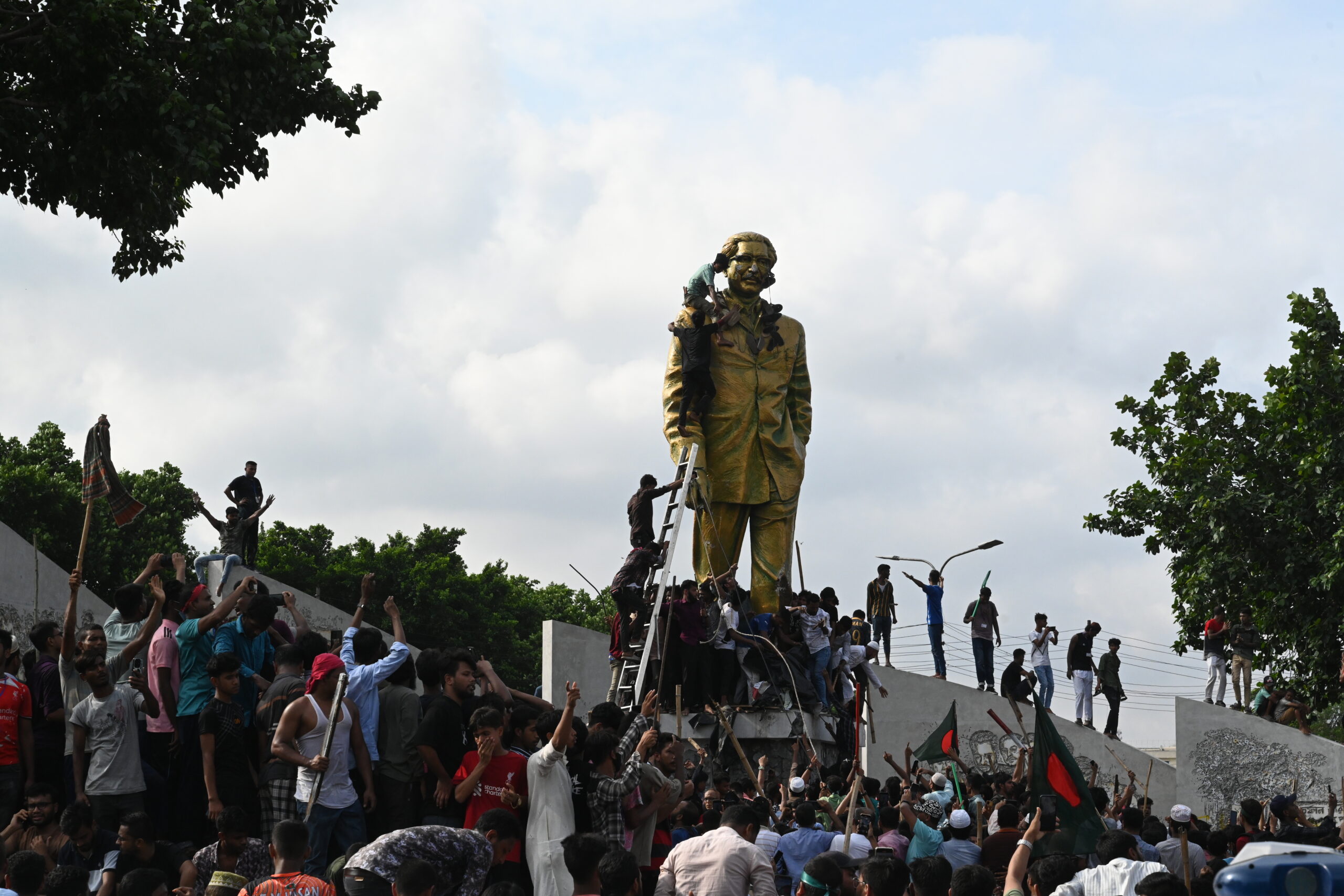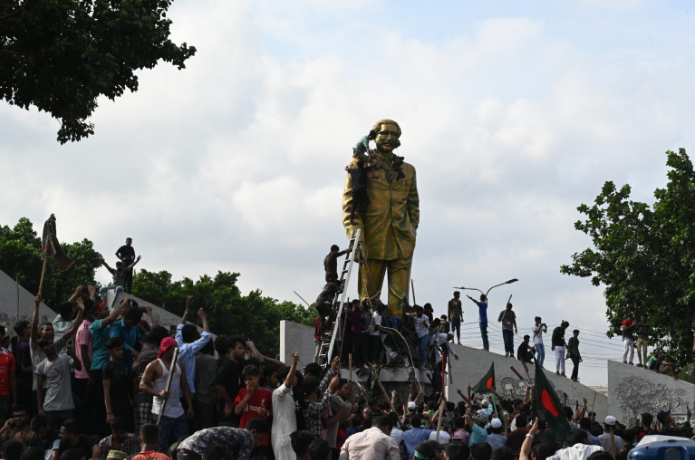
History is a stern taskmaster. People in power invariably take liberties with her. But she has the last laugh.
No better example of this dictum exists than the increased questioning of Sk. Mujib’s role in Bangladesh’s history especially of its independence struggle since his daughter ex-PM Sk.Hasina fled to India on 5 August. Her departure has allowed the Bangladeshi public to speak openly and frankly about her father’s role.
This became necessary as during her long and unsavoury rule from 2009 to 2024, Sk.Hasina deified Sk. Mujib as the main and sole origin and source of Bangladesh’s independence. Not content with using conventional methods such as tiresome repetition in the media to propagate this message, Sk. Hasina resorted to legislation. Thus, the fifteenth amendment in 2011 to the Bangladesh constitution proclaimed, amongst other claims, that Sk. Mujib was the father of the nation.
Both the claim and medium were unique. But Sk. Hasina did not stop there. By executive fiat, she decreed eight national holidays. Bizarrely, six of them related to her family members. Three relate to Sk. Mujib: his birth date, 7 March 1971 speech and assassination on 15 August 1975. The other three, with audacious irrationality, covered the birth anniversaries of Sk. Hasina’s murdered mother and two brothers.
The unholy intention of these two projects was to monopolise and assert exclusive credit for Bangladesh’s independence for her father—a claim though debatable has some merit—and her immediate family members through dint of being killed—a claim without merit. It’s not surprising that there has been a predictable backlash against these claims.
Two recent official examples of this backlash happened on 16 October 2024. The first was the statement by student leader and current adviser Nahid Islam that the interim government does not recognise Bangabandhu Sheikh Mujibur Rahman as the Father of the Nation. The second was that the interim government has cancelled eight national days including one celebrating Sk. Mujib’s 7 March speech.
The father honorific and significance of 7 March speech have been controversial issues for some times, even before Sk. Hasina tried to elevate them into “settled” issues by legislation. The controversy over 7 March speech focused on whether this was a unilateral declaration of independence (UDI).
Supporters claim that it was. Sk. Mujib’s speech referred to the Bengalis ongoing struggle “for freedom (mukti)…and independence (shadhinata).” Other observers point out that these two words are a far cry from an explicit proclamation of UDI.
They note that Mujib’s circumspection reflected the decision of the Awami League Working Committee of 6 March 1971 that UDI’s costs would exceed benefits. This was undoubtedly influenced by Dhaka military garrison’s threat to “raze Dacca to the ground.” (Kamal Hossain, Bangladesh: Quest for Freedom and Justice, 87; Maj. Gen. Khadim Hussain Raja, A Stranger in my own Country, East Pakistan 1969-1971, 62).
These observations plus the fact that the Awami League was a constitutionalist not a revolutionary party suggest that the 7 March speech was a call for further action, even militancy, but not, or just short of, a clarion call for independence. That the Awami Leaguers had hopes, however faint, of a settlement is testified by their willingness to agree to negotiations with the junta commencing 15 March 1971.
Bestowing the honorific Father of the Nation upon Mujib endows him with untenable papal infallibility. To be sure, Mujib had undoubted accomplishments, suffered imprisonment for his beliefs, skillfully piloted the Six Points, praised Delhi’s contribution but got Indian troops to leave by March 1972 and used his unparalleled international prestige to secure recognition of Bangladesh with commendable swiftness.
Against these achievements must be set-off negative factors such as Mujib’s voluntary surrender, never explained, to the Pakistan Army on 25 March 1971; his inexplicable and stubborn refusal (inferiority complex?) to be briefed by Tajuddin on what happed in the exile-government in 1971; the famine of 1974 under his watch; rabid but ill-advised misuse of the Jatiya Rakkhi Bahini (JRB)—the notorious successor of the RAW-sponsored Mujib Bahini formed in Calcutta around April 1971—to crush and kill his opponents; and finally the recourse to authoritarianism under the malign influence of his nephew Sk. Moni—this relationship bears research– through establishing BAKSAL in February 1975.
Taken all these things together, we can agree with the Dhaka Tribune’s editorial of 15 August 2024 that Mujib’s “place in Bangladesh’s history is unquestionable.” This conclusion is not rocket science. But it begs the question of how to evaluate BB’s place objectively?
Given the passions amongst Mujib’s supporters and opponents, this evaluation will be tricky. A clue is available from modern Chinese history. In 1981, five years after Mao Zedong died, the Chinese Communist Party concluded that he was 70 per cent right and 30 per cent wrong in his long political career.
Using this analogy, it is fair and reasonable to infer that Sk. Mujib, arguably not as great a leader as Mao, was not 100 per cent correct, as Sk Hasina mandated and would have us believe, in his political decisions and actions. The question is: how much was he right and how much wrong?
The Awami League would be the most appropriate entity to render this judgment. But to expect this from this narcissist, flawed and intellectually bankrupt party is unrealistic, especially as it’s currently in thrall to Sk. Mujib’s loquacious grandson issuing unhinged thunderbolts from his luxurious US exile.
This profound but urgent task of evaluation must necessarily be left to the current crop of rising Bangladeshi historian-scholars. Hopefully, they will use tested historical techniques of ascertaining facts mainly through documentary evidence and cross-checking circumstantial evidence to reach a reasoned evaluation of Sk. Mujib’s political contribution.
It’s self-evident that such scholarly evaluations will differ. They should. Let a thousand flowers bloom. That’s the essence of history. Historians are still fighting over the causes of the First World War. Rigorous historical debate over Sk. Mujib’s role should be welcomed and encouraged.
Nahid Islam’s statement and the interim government’s decision naturally will arouse dissension and debate, as it should. The Daily Star’s editorial of 17 October 2024 noted that the cancellation of the 7 March national day is an ill-timed revisionist attempt serves no purpose, though its rationale leaves something to be desired.
But the above statement and decision have opened the Pandora’s box of a long overdue balanced and valid historical assessment not only of Sk. Mujib’s contribution but of the other pertinent objective and subjective factors of our independence struggle. This involved a worthy cast of thousands, not half a dozen members of a bourgeois Bengali family.
While Sk. Mujib’s contribution is subject to gruelling honest and honourable debate, no such redeeming features exist in evaluating Sk. Hasina’s premiership. This was Quislingism on steroids.
It was RAW’s notable achievement to recruit the head of a government as its agent. All good things must come to an end. So was the abrupt conclusion of the RAW-Sk. Hasina relationship.
It’s only fitting that she’s being hosted in exile by Delhi which has received tons of unilateral benefits from the former PM. The RAW-Sk. Hasina relationship spanning 1975 till 2024 is worthy of penetrating scholarship. This won’t be easy because of lack of access to Indian archives and sources.

